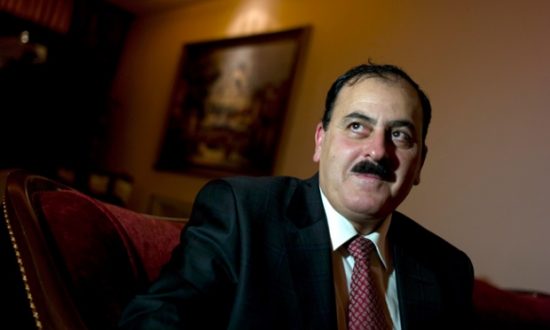Syria conflict: New rebel leader makes plea for weapons
Abu Furat, the rebel commander who was killed over the weekend, was suspicious of jihadi fighters, despite having to rely on them for support, Martin Chulov recalls.
Speaking via Skype from Beirut, Chulov said Furat was “very uncomfortable about the creeping jihadi trend. He did whatever he could to keep Jabhat al-Nusra at bay”.
After his defection Furat fought as a private soldier rather than a colonel to prove his credentials as a rebel, Chulov said.
For every battle that his rebel unit Liwa al-Tawhid fought he was literally leading the charge. He was the first man over the wall, he was the first man down the streets. He very quickly developed a reputation as a formidable fighter …
He was killed at the weekend doing what he’d done for the last six months. He was killed by a tank round as rebel units attacked an infantry school. His loss will be very deeply felt among the Liwa al-Tawhid.
Chulov added:
He used to try and pass on messages to any foreigners who came into town that he wanted to speak to foreign governments because he wanted to help them secure chemical weapons sites.
Furat would deliberately wind-up jihadi groups, Chulov recalls.
I remember our last conversation. Abu Furat said to me that he’s being forced to dance with the devil and he doesn’t want to do it. But every time they came to see him in his small flat in Saif al-Daulu [in south-east Aleppo] he took delight in having dancing girls on the television in the background, and smoking cigarettes, while these emirs of al-Qaida sat with him, because he knew it would make them uncomfortable. He felt it was important to stress to them that he was meeting them on his terms not on theirs.
Abu Furat was a genuine secular nationalists and they [his brigade] respected him for it. There are not all that many people who would step into the breach and I’m worried that there will be more a jihadist trend to the leadership.
The Syrian government’s air attack on the Yarmouk Palestinian camp has changed the dynamic of the conflict quite dramatically, Chulov added.
It has been very important to the regime’s resistance credentials that they had the Palestinians under their wing. But this attack seems to have changed that. The Palestinians we spoke to said blood has been drawn between them and the regime and they can never trust them again. If this is a sentiment that is broadly felt then that it is a turning point. The Palestinians have been one of the regime’s core constituencies.
It is difficult to understand what they were trying to achieve [by attacking the camp]. It is true that Free Syrian Army units had been outside the camp. But we have been able to pick up no real indication that they had entered. They did enter after this airstrike and did take the fight to a minority Palestinian faction [loyal to Assad], headed by Ahmed Jibril. That fight was a rout. Ahmed Jabril’s guys were cast out of the camp within a couple of hours.
They [the Assad government] have miscalculated. There were large numbers of Palestinians that did support the regime and did believe the regime would be their backer. But that support base has been whittled away by the events of the last few days and large numbers of Palestinians are now on the move and now refugees for a second time.
Rebels genuinely believe that if they can get access to more anti-aircraft guns they can quickly topple the Assad government, Chulov said.
The Syrian air force has been flying higher than ever after rebels shot down a helicopter and a jet last month using surface-to-air missiles.
Attacks on Aleppo from the air have diminished significantly.
On the ground the rebel forces do feel incentivised to step up their actions, because they don’t fear the air force as much as they used to.The regime is losing control of the north of country, partly because the potency of the airforce has been reduced by the rebel groups getting their hands on surface-to-air missiles.
On the current state of the battle, Chulov said:
The regime does have a pretty good hold on Hama, on the Alawite heartland areas, and on the south. They don’t have a hold, or much of one, on northern Aleppo where they are losing. In Damascus they are not losing, but they are not winning either. In the east of the country, Jabhat al-Nusra, the al-Qaida group has stormed most bases and is now in control of Hassaka.
In the coming days and weeks the main focus will be on Damascus more so than Homs, Hama or Deraa where the attritional series of battles with rebels on the outskirts and the regime in control of the centre will continue
guardian


